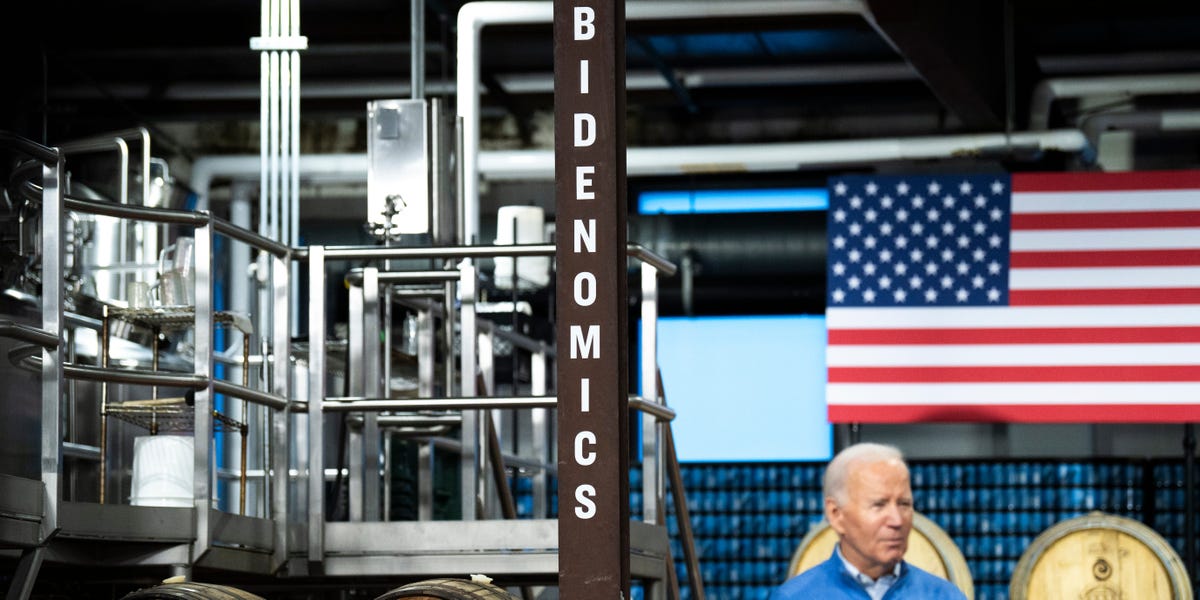President Biden has won quite a few fans in the climate tech sector during this time in office.
On his first day as president, he made a commitment to haul the US back into the Paris Agreement, the international treaty dedicated to curbing global warming.
Since then, his administration introduced numerous policies, most notably the $369 billion Inflation Reduction Act (IRA), that have placed startups tackling the climate crisis in high demand.
Founders, investors, and stakeholders alike will watch November’s US election with great interest, but many of them feel confident that support will continue even if a new president is elected.
“We’re expecting a season of headlines in the US,” Sierra Peterson, a cofounding partner in Voyager Ventures who previously held climate policymaking roles, told Business Insider.
“But fundamentally, not much will change in actual deployments of decarbonization technology and retooling of the US economy to be more robust, particularly against geopolitical threats.”
Legislation, including the IRA, the Bipartisan Infrastructure Law, and the CHIPS and Science Act, has unlocked enormous amounts of capital that bolsters climate tech innovation and adoption.
There are compelling economic reasons for a new administration to continue supporting these laws that go beyond just combatting the climate crisis. The laws have aided in job creation, supply chain resilience and independence, stakeholders said.
There is a chance the rollout of policies and schemes could slow, though. That’s because agencies implementing them could see turnover and different implementation mandates, according to Katie Hoffman, partner at venture capital firm Regeneration VC and Senior Fellow at bipartisan think tank The Future US.
“We know that the legislation has been passed and it will remain, and it’s now about how it is implemented,” she said.
Many climate projects have bipartisan support
Battery facilities, carbon removal, computer chips, and critical materials mining have bipartisan support.
“We know that many red states and states that might even go for Trump are going to be the beneficiaries of the implementation of these bills, bringing manufacturing to the Dakotas, Nevada, Arizona,” Hoffman said.
“Call it a green revolution, call it good jobs, whatever it might be. We don’t anticipate that Trump is going to roll back anything that’s going to support his base in job creation and minimizing our reliance on foreign powers for goods, services, and critical materials.”
European company Climeworks was one of many lured to the US by its favorable climate policies. It is set to create jobs in Louisiana and North Dakota, both energy-producing states, and California as part of the $3.5 billion Regional Direct Air Capture (DAC) Hubs program. Direct air capture is the process of extracting CO2 directly from the atmosphere via a chemical reaction.
The Swiss company would have expanded Stateside eventually, but such policies helped it pick up pace, said Andrew Fishbein, Climeworks’ senior policy manager in the US.
“We’re not waiting for a shoe to drop where there’s some going to be kind of apocalyptic change, because, again, there’s bipartisan support fundamentally for what we want to do,” he said. The company is still finalizing details with the Department of Energy for its project.
Major investments have already been made in building battery factories, which will help to deploy more EVs, said Kevin Stevens, partner at Energize Capital and head of the firm’s growth strategy. The investor backs energy software, typically layered on top of hardware assets. “Those things are in play, they’re happening,” he said.
Getting money out the door
A Trump administration could emphasize jobs over climate, resulting in budget cuts for climate innovation research and development at national agencies, affecting anything that doesn’t fit under the remit of very clear-cut onshoring, energy, or minerals, Regeneration VC’s Hoffman said. But that’s an opportunity for investors, she added.
“We’ve seen so much capital flowing into climate funds that have dry powder, that are prepared to make investments and maybe take on more risk if the government is not going to shoulder that,” Hoffman said.
Nuclear or hydrogen tax credits may also face more scrutiny, according to Energize Capital’s Stevens.
For private companies and their investors, the focus is on backing economically viable opportunities that can succeed with or without government boosts.
For example, Regeneration VC doesn’t factor subsidies into its investment decisions or portfolio companies’ financial projections. Still, it looks at the policy environment as a whole as it impacts growth opportunities for its companies, Hoffman said.
Energize Capital’s Stevens added: “Policy can be a tailwind, but it should never be a headwind.”
In the meantime, “it’s possible that some in Washington are motivated to get the IRA money out the door this year because of the risk of administrative change,” according to Ben Wolkon, partner at MUUS Climate Partners, who started his career in solar.
“Who knows, maybe 2024 is going to be a banner year for climate tech,” he said.
Read the full article here





